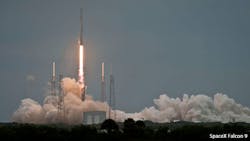Not long ago, SpaceX founder Elon Musk cracked what he once labeled a monopoly for Defense Department space launches, successfully breaking into a business that was dominated by United Launch Alliance LLC.
The DOD’s appetite for space access is voracious, given the myriad reconnaissance, defense, and communications roles there, coupled with a future where conflicts are almost certain to involve space assets. Musk’s 2014 lawsuit against the government was settled out of court and the Pentagon certified SpaceX, also known as Space Exploration Technologies Corp., as a suitable supplier of military space launches.
SpaceX’s first gig for the military was in May when it launched a satellite for the National Reconnaissance Office. But in a very public sense, Musk and the government this summer will test the theory that cheaper space launches are suitable for sensitive military missions.
In August, SpaceX will carry one of the Pentagon’s premiere yet highly classified platforms into orbit. The X-37B spy craft, an unmanned miniature version of the Space Shuttle, logs missions that are well over a year in length. The most recent X-37B sojourn ended in May after more than 700 days circling the Earth. Boeing has built two of the craft, with the first launched in 2010. The August blastoff will be the program’s fifth flight. One major reason for SpaceX’s appeal to Pentagon brass: sticker price. With its launches starting around $61 million, Musk’s company has been able to undercut its more established rival. United Launch Alliance, a Colorado-based joint venture of Boeing Co. and Lockheed Martin Corp., boasts an unblemished record of more than 100 launches, but it’s still working to bring its cost below $100 million. It plans to do so by 2019.
On Friday, ULA’s president and chief executive, Salvatore “Tory” Bruno, said on Twitter that his company wanted to compete for the X-37B launch but wasn’t given a chance to do so.
“ULA remains fully committed to continuing to support America’s national security missions with world-class launch services,” spokeswoman Jessica Rye said in an email. A SpaceX spokesman, John Taylor, referred inquiries to the Air Force, which didn’t respond to requests for comment.
ULA officials, while touting their record, also argue that the cost comparison isn’t so simple because it provides the DOD redundant platforms and other launch systems, with both its Atlas and Delta rockets, to ensure launch readiness at any time—something its rivals do not.
SpaceX’s new role as a military contractor is a key source of income for Musk’s company and supplements its NASA contracts for resupply missions to the International Space Station. Its far more ambitious plan, flying astronauts to the ISS, is set for next year.
In February, SpaceX said it would also fly two private space tourists around the moon in 2018, though it didn’t disclose their identities or how much they have paid for the trip.
By Justin Bachman
About the Author
Bloomberg
Licensed content from Bloomberg, copyright 2016.
